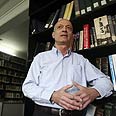
When speaking Arabic, Gabriel Rosenbaum is assiduous about observing the Egyptian variations of the language so alien to many of his fellow Israelis.
Three decades into a peace accord that has not much deepened understanding, he considers such immersion key to running the Israeli Academic Centre in Cairo, where Egyptians can similarly grow intimate with the Hebrew language and culture.
"I think the problem is that neither side knows the other," says Rosenbaum, a professor on leave from the Hebrew University of Jerusalem and also affiliated with Cambridge University.
"When you get to know a place, when you get to know the people, when you get to know the culture, you see that there is nothing to be afraid of. And that's what we do here at the academic centre."
Scholarly interest in Hebrew is nothing new for Egypt, a nexus of antiquity. The Jewish state's founding in a 1948 war lent the language a tactical utility for Egyptian intelligence, as well as for the broadcasters who, in often comically unidiomatic Hebrew, would air messages urging Israelis to surrender.
Talk of historical conflict, or the more recent bilateral tensions over Israel's Gaza offensive and hawkish new government, is largely avoided in the Academic Centre. It's an airy apartment on the Nile waterfront converted to house three reading rooms, shelves lined with literature and criticism.
Hebrew in academia, civil service
According to Rosenbaum, several universities in Cairo and beyond offer Hebrew classes, which are taken by 5,000 to 6,000 students a year.
One graduate was Eman Gamal El Din, a guide who tends to the trickle of Israeli tourists, and whose conservative Islamic headscarf contrasts with her comfort and fluency in Hebrew.
"I began with wanting to know more about the holy scriptures, and about the Jewish people, and it grew from there," she says.
While Rosenbaum, 61, says many Hebrew students are simply discharging a syllabus obligation, others use the language in careers in academia, the leisure industry or civil service.
Close police guard
Funded by Israeli universities, the Academic Centre provides contemporary texts that may be unavailable on Egyptian campuses. Cairo's cultural unions have long boycotted Israel, partly in protest at its policies towards the Palestinians.
"What we have here is everything that a student needs in order to learn Hebrew," says Amr Zakareya, an Egyptian who first came to the centre as an undergraduate in 1989 and wound up becoming its administrative director.
Rosenbaum admits that the political situation hurts turnout for the lectures by visiting Israeli academics and artists that he and his wife, Michal, put on. The centre is also under close police guard, which can discourage casual browsers from coming.
"We are not on a diplomatic mission. We are academics," he says. "But still, we try to explain the Israeli point of view in any field. Some of those who come here are just curious to find out more about their ex-enemy, who is now their friend."















